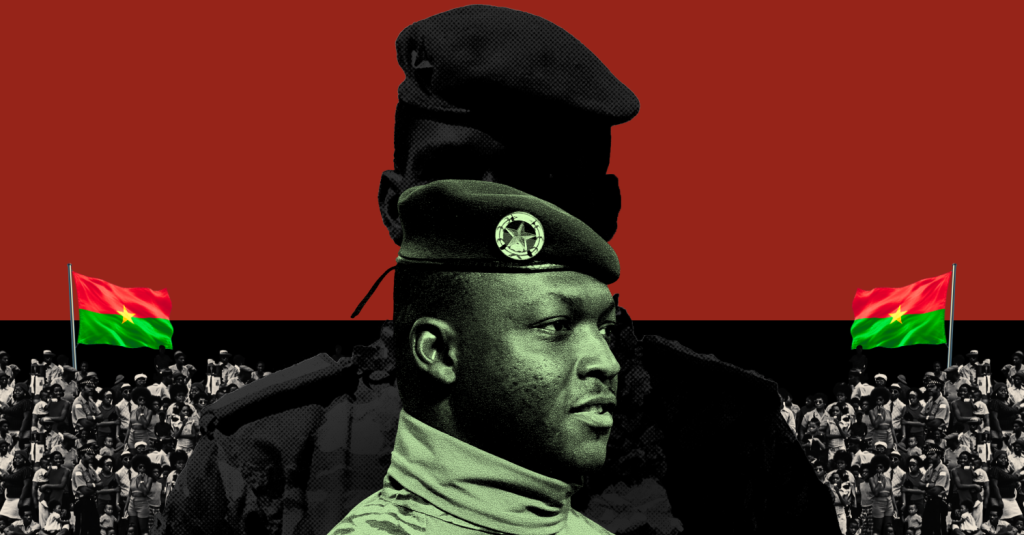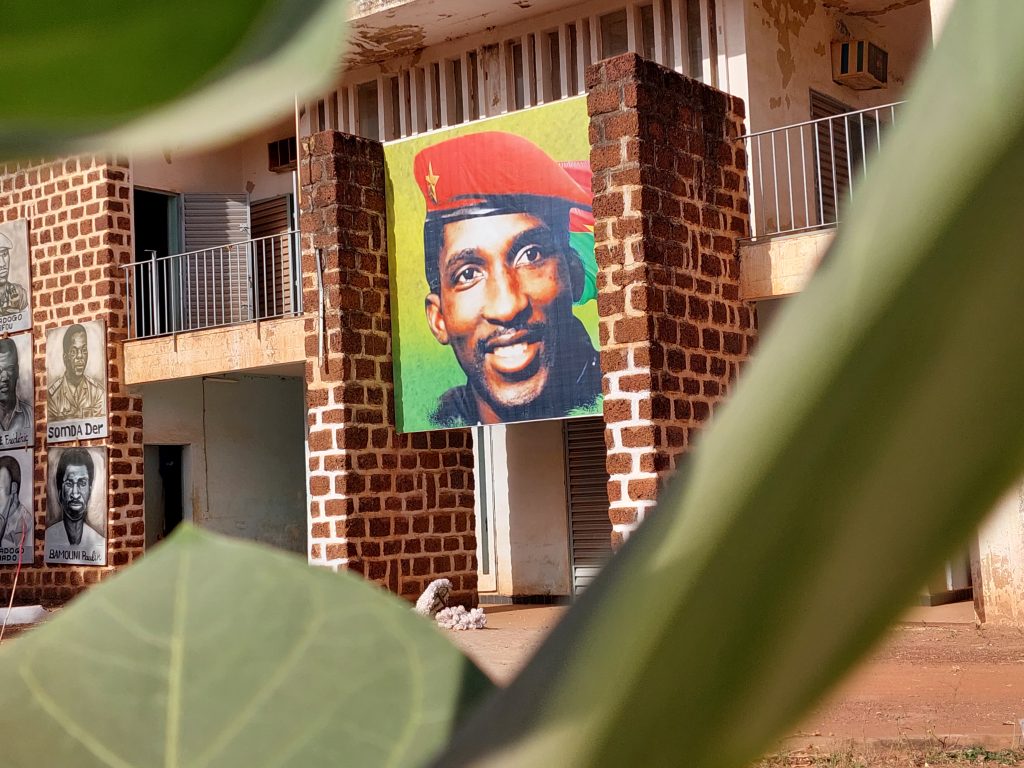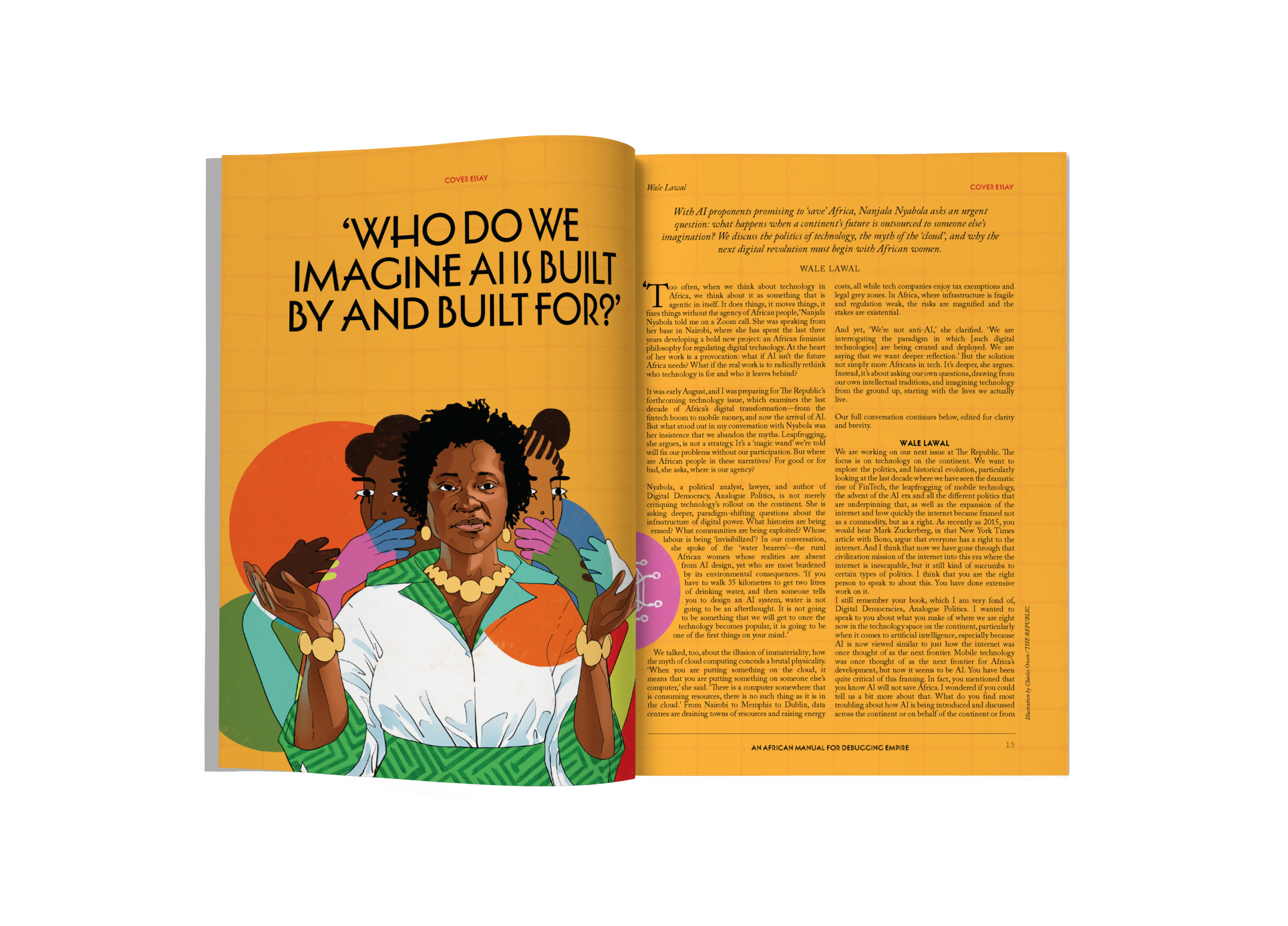
Photo illustration by Dami Mojid / THE REPUBLIC. Source Ref: ALEXANDER KRYAZHEV for RIA NOVOSTI / WIKIMEDIA.
THE MINISTRY OF WORLD AFFAIRS
Is Ibrahim Traoré the Pan-Africanist Africa Needs?

Photo illustration by Dami Mojid / THE REPUBLIC. Source Ref: ALEXANDER KRYAZHEV for RIA NOVOSTI / WIKIMEDIA.
THE MINISTRY OF WORLD AFFAIRS
Is Ibrahim Traoré the Pan-Africanist Africa Needs?
‘He who feeds you, controls you.’
— Thomas Sankara, former president of Burkina Faso
Captain Ibrahim Traoré rose to power in Burkina Faso in October 2022, following the country’s second coup that year. At just 34 years old, his youth and military rhetoric have drawn frequent comparisons to Thomas Sankara, the iconic revolutionary leader who governed in the 1980s. Traoré portrays himself as a new revolutionary, invoking Sankara’s legacy of self-reliance, anti-imperialism, and pan-Africanism. Traoré’s rise signals the possibility of an ideological shift toward a new, self-defined regional role for Burkina Faso. His leadership also raises critical questions about the substance of pan-Africanist claims, the dangers of authoritarian consolidation, and the region’s vulnerability to geopolitical influence. Much like Sankara, Traoré’s rise amid political instability signals more than a leadership change; it signals a potential ideological shift, one that seeks to redefine Burkina Faso’s role in a multipolar global order.
Yet, while Traoré and leaders like him are right to stress anti-Westernism and decolonization, this conspiratorial lens can energize efforts to resist those who threaten national autonomy; however, it should not be the sole measure of leadership. Criticism is warranted, particularly regarding his blocking of democratic elections, the expansion of jihadist-held territory under his rule, and his use of misinformation to overstate achievements.
Against this backdrop, assessing Traoré’s governance necessitates a closer examination of how local demands for autonomy, enduring colonial influences, and ongoing geopolitical contests intersect. This provides context for weighing the ideals of pan-Africanism against the real risks of authoritarianism that shape the country’s current direction.
BREAKING FROM THE PAST: ANTI-COLONIAL SENTIMENT AND SOVEREIGN ASSERTION
Traoré has positioned himself as a leader committed to dismantling what he perceives as enduring French neocolonial influence in Burkina Faso, echoing the revolutionary ethos of Thomas Sankara. This stance resonates with a populace frustrated by decades of economic dependency, persistent insecurity, and what many consider France’s paternalistic role. By invoking Sankara’s memory, Traoré taps into a powerful historical narrative, positioning himself as the steward of renewed independence.
One of his first symbolic acts was the expulsion of French military forces in early 2023. This mirrored trends in Mali and Niger, where scepticism of French counterterrorism efforts has grown. Burkina Faso has pursued greater control over natural resources, establishing a national gold refinery in 2024 and suspending certain small-scale mining exports in 2024. Such measures aim to maximize domestic benefit from mineral wealth, reduce capital flight, and combat corruption.
Culturally, the Traoré government has sought to promote indigenous practices and languages, moving away from French-centric judicial and administrative systems. Traditional attire has been promoted in courts, signaling a reclaiming of national identity.
However, local initiatives to assert sovereignty occur alongside significant challenges: jihadist insurgencies, resource scarcity, and political centralization. Security remains precarious, underscoring the limitations of symbolic anti-colonial gestures when structural challenges are overlooked.
Al-Qaeda- and ISIS-affiliated groups operate widely in the Sahel, and Burkina Faso faces growing security threats. Traoré’s military approach emphasizes unilateral action and external partnerships. Russia, for example, has established a military base in Ouagadougou since 2024, while mercenary groups like the Wagner Group have assisted in training and operations.
Despite this, jihadist insurgencies continue to expand. Traoré’s approach, centralized, militarized, and often reactive, has yet to produce decisive security gains. Critics argue that isolating Burkina Faso from regional mechanisms, such as ECOWAS, undermines collective security strategies, forcing reliance on external actors whose interests may not align with Burkinabé sovereignty.
shop the republic
-
‘The Empire Hacks Back’ by Olalekan Jeyifous by Olalekan Jeyifous
₦70,000.00 – ₦75,000.00Price range: ₦70,000.00 through ₦75,000.00 -
‘Make the World Burn Again’ by Edel Rodriguez by Edel Rodriguez
₦70,000.00 – ₦75,000.00Price range: ₦70,000.00 through ₦75,000.00 -
‘Nigerian Theatre’ Print by Shalom Ojo
₦150,000.00 -
‘Natural Synthesis’ Print by Diana Ejaita
₦70,000.00 – ₦75,000.00Price range: ₦70,000.00 through ₦75,000.00

THE ALLIANCE OF SAHEL STATES: REGIONAL REALIGNMENT
In 2024, Burkina Faso, Mali, and Niger formed the Alliance of Sahel States (ASS) as a regional counterweight to the Economic Community of West African States (ECOWAS). By January 2025, all three countries had formally withdrawn from the West African bloc, citing dissatisfaction with sanctions and diplomatic pressure after coups. The ASS promotes shared defense, economic cooperation, and cultural solidarity, echoing anti-colonial ideology.
However, according to Dr. Abdourahmane Idrissa, a leading scholar of the Sahel stated in an interview I conducted in 2025 that, ‘the alliance is largely symbolic. Borders remain open, currency zones intact, and economic frameworks unchanged. Unlike ECOWAS, the ASS does not enforce democratic norms. By providing a framework that legitimizes authoritarian consolidation, the ASS risks isolating the region from established mechanisms for cooperation, development, and accountability.’
France’s influence on West Africa began with its colonial rule in the 19th and 20th centuries, which significantly shaped the political, economic, and cultural development of countries such as Burkina Faso. France maintained intimate relations after independence through the deployment of soldiers, economic ties, and political influence, controversially referred to as ‘Françafrique.’
Many West Africans believe France maintains a neo-colonial grip through incursions, mining deals and political interference, which is a contested aspect of France’s legacy. The recent surge in anti-French sentiments in the Sahel speaks to an eruption of outrage over supposed exploitation and a failure to respond to security concerns adequately. Operations like 2014’s Operation Barkhane have been criticized for failing to curb insurgencies and fueling resentment. Anti-French sentiment has surged, creating openings for other powers.
Russia’s re-emergence in Africa, and indeed in the Sahel, forms part of a grand strategy driven by a legacy of Soviet engagement aimed at reclaiming world leadership by countering Western dominance. During the Cold War, the Soviet Union established ties in Africa by providing military assistance, ideological support, and patronage to anti-colonial forces. One emblematic figure of this era was Sankara, the revolutionary leader of Burkina Faso, who admired Marxist principles but sought an independent, self-reliant path for African development. Although Sankara accepted some Soviet assistance, he remained wary of neocolonial dependency, whether from the East or West, insisting that true liberation required African ownership of its political and economic destiny. With the collapse of the Soviet Union in 1991, Russian influence over the continent declined precipitously. However, Moscow has recently begun a new strategy, especially in politically exposed areas of the Sahel region, through security partnerships, information operations, and resource grabs to resist Western influence, particularly that of France. Ironically, this new wave of Russian engagement often operates in ways that Sankara would likely have criticized, as external powers once again exploit African insecurity for geopolitical gain.
Moscow’s strategy is opportunistic and constitutes part of an overall attempt at geopolitics to realign the international order in Moscow’s favour. Russia’s actions in Burkina Faso and surrounding states demonstrate a lack of post-colonial legacy, allowing it to engage as a sovereign and non-interventionist partner. Russia has rapidly occupied the security landscape in Burkina Faso within a brief period of security cooperation, including the supply of military hardware and training, as well as the operations of private military firms like Wagner. Russia also employs diplomacy, capitalizing on its permanent membership in the UN Security Council and its stance on the Ukraine war to rally African nations behind it. Economic cooperation, which lags behind China’s substantial regional investment, is increasing. Russia is offering financial support in agriculture, mining, and infrastructure development, among others, as a diversified player.
shop the republic
THE LIMITS OF TRAORÉ’S PAN-AFRICANISM
Traoré’s rhetoric positions him as a pan-Africanist, but his record raises questions. Dr. Idrissa contends that his ‘ideological foundation is shallow: rather than fostering genuine regional cooperation or continental progress,’ Traoré isolates Burkina Faso from democratic institutions without presenting a viable alternative.
Sankara, despite flaws, sought depth and continental reform. Traoré’s policies have centralized power, reflecting authoritarianism more than revolutionary vision. Criticism of Traoré must also be measured. Well-meaning democratic idealists often lack the resources and influence of political elites or foreign powers. Yet when their critique mirrors that of external actors, it can be co-opted, inadvertently strengthening efforts to remove him and restore the very structures that citizens have long rejected. Being right is not enough; honesty and clarity are essential to avoid serving agendas that contradict democratic values.
shop the republic
PRINCIPLES OF GENUINE PAN-AFRICAN LEADERSHIP
If Traoré is not the pan-Africanist his supporters claim him to be, what should true pan-African leadership look like? A genuine Pan-Africanist cannot be defined merely by reactionary anti-Western sentiment, but rather by visionary principles. True leadership demands a commitment to equity, justice, and the equitable distribution of power and resources. It means building societies where people are treated with dignity, not oppressed by institutions that claim to serve them.
Criticism of Traoré should guide the continent toward this vision, moving beyond the individual to develop political systems capable of meeting Africa’s challenges. Anything less risks recycling past failures under new rhetoric.
There is no simple stance on Traoré. Ignoring his autocracy is negligent, but so is dismissing his popularity. He is not yet the pan-Africanist the continent needs, lacking consensus-building, strong institutions, justice, regional collaboration, and a global outlook.
At the same time, Traoré’s anti-imperialism resonates with a long-suppressed desire for sovereignty. Many West Africans see in him a break from decades of external exploitation. Recognizing these legitimate grievances while holding him accountable is crucial to developing a nuanced and honest approach to African leadership.
The 2022 Russian invasion of Ukraine underscored the interconnectedness of global politics. African nations, including Burkina Faso, have been drawn into broader East-West tensions through their involvement in energy, food security, and diplomatic alignments. Russia’s disinformation campaigns and strategic outreach exemplify the increasing impact of global information warfare. Burkina Faso sits at the crossroads of these forces, navigating both opportunity and risk.
For West Africa, the implications are profound. The ASS challenges ECOWAS, and Burkina Faso’s trajectory could influence regional stability, economic cooperation, and democratic norms. Engaging with the country requires humility, respect, and support for sovereignty, but also vigilance about the risks of authoritarian consolidation and external manipulation.
Ultimately, Burkina Faso’s path under Traoré reflects a wider struggle unfolding across the continent: how to assert independence in a polarized world without succumbing to new forms of dependency. The choices made in Ouagadougou will reverberate beyond Burkina Faso’s borders, shaping not only the Sahel’s security and governance but also the broader question of whether Africa can chart a truly post-imperial future⎈
BUY THE MAGAZINE AND/OR THE COVER
-
‘The Empire Hacks Back’ by Olalekan Jeyifous by Olalekan Jeyifous
₦70,000.00 – ₦75,000.00Price range: ₦70,000.00 through ₦75,000.00 This product has multiple variants. The options may be chosen on the product page -
The Republic V9, N3 An African Manual for Debugging Empire
₦40,000.00
US$49.99












